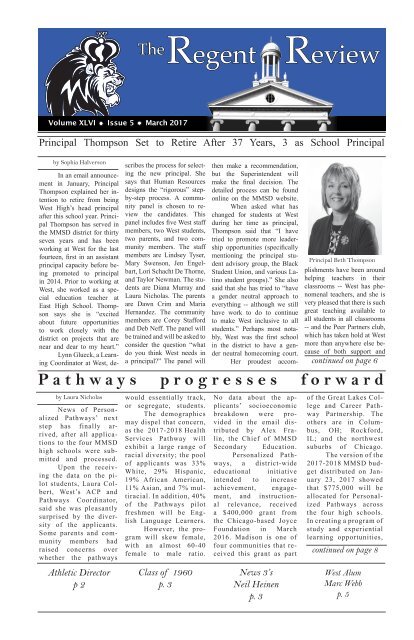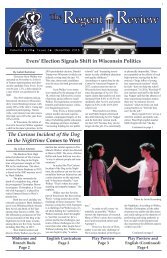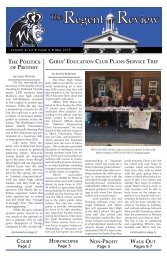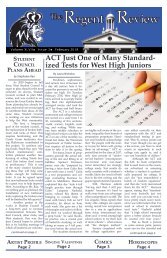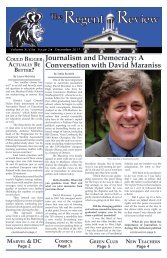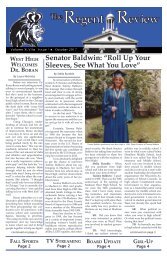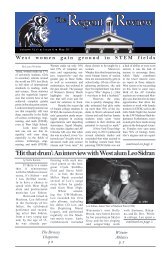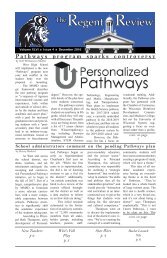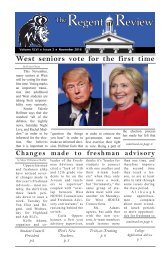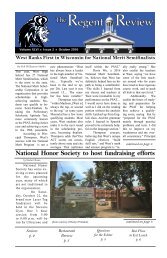Create successful ePaper yourself
Turn your PDF publications into a flip-book with our unique Google optimized e-Paper software.
The <strong>Regent</strong><br />
<strong>Review</strong><br />
Volume XLVI Issue 5 <strong>March</strong> <strong>2017</strong><br />
Principal Thompson Set to Retire After 37 Years, 3 as School Principal<br />
by Sophia Halverson<br />
Athletic Director<br />
p 2<br />
In an email announcement<br />
in January, Principal<br />
Thompson explained her intention<br />
to retire from being<br />
West High’s head principal<br />
after this school year. Principal<br />
Thompson has served in<br />
the MMSD district for thirty<br />
seven years and has been<br />
working at West for the last<br />
fourteen, first in an assistant<br />
principal capacity before being<br />
promoted to principal<br />
in 2014. Prior to working at<br />
West, she worked as a special<br />
education teacher at<br />
East High School. Thompson<br />
says she is “excited<br />
about future opportunities<br />
to work closely with the<br />
district on projects that are<br />
near and dear to my heart.”<br />
Lynn Glueck, a Learning<br />
Coordinator at West, describes<br />
the process for selecting<br />
the new principal. She<br />
says that Human Resources<br />
designs the “rigorous” stepby-step<br />
process. A community<br />
panel is chosen to review<br />
the candidates. This<br />
panel includes five West staff<br />
members, two West students,<br />
two parents, and two community<br />
members. The staff<br />
members are Lindsey Tyser,<br />
Mary Swenson, Jen Engelbart,<br />
Lori Schacht De Thorne,<br />
and Taylor Newman. The students<br />
are Diana Murray and<br />
Laura Nicholas. The parents<br />
are Dawn Crim and Maria<br />
Hernandez. The community<br />
members are Corey Stafford<br />
and Deb Neff. The panel will<br />
be trained and will be asked to<br />
consider the question “what<br />
do you think West needs in<br />
a principal?” The panel will<br />
Class of 1960<br />
p. 3<br />
News 3’s<br />
Neil Heinen<br />
p. 3<br />
then make a recommendation,<br />
but the Superintendent will<br />
make the final decision. The<br />
detailed process can be found<br />
online on the MMSD website.<br />
When asked what has<br />
changed for students at West<br />
during her time as principal,<br />
Thompson said that “I have<br />
tried to promote more leadership<br />
opportunities (specifically<br />
mentioning the principal student<br />
advisory group, the Black<br />
Student Union, and various Latino<br />
student groups).” She also<br />
said that she has tried to “have<br />
a gender neutral approach to<br />
everything -- although we still<br />
have work to do to continue<br />
to make West inclusive to all<br />
students.” Perhaps most notably,<br />
West was the first school<br />
in the district to have a gender<br />
neutral homecoming court.<br />
Her proudest accomplishments<br />
have been around<br />
helping teachers in their<br />
classrooms -- West has phenomenal<br />
teachers, and she is<br />
very pleased that there is such<br />
great teaching available to<br />
all students in all classrooms<br />
-- and the Peer Partners club,<br />
which has taken hold at West<br />
more than anywhere else because<br />
of both support and<br />
Pathways progresses forward<br />
by Laura Nicholas<br />
News of Personalized<br />
Pathways’ next<br />
step has finally arrived,<br />
after all applications<br />
to the four MMSD<br />
high schools were submitted<br />
and processed.<br />
Upon the receiving<br />
the data on the pilot<br />
students, Laura Colbert,<br />
West’s ACP and<br />
Pathways Coordinator,<br />
said she was pleasantly<br />
surprised by the diversity<br />
of the applicants.<br />
Some parents and community<br />
members had<br />
raised concerns over<br />
whether the pathways<br />
would essentially track,<br />
or segregate, students.<br />
The demographics<br />
may dispel that concern,<br />
as the <strong>2017</strong>-2018 Health<br />
Services Pathway will<br />
exhibit a large range of<br />
racial diversity; the pool<br />
of applicants was 33%<br />
White, 29% Hispanic,<br />
19% African American,<br />
11% Asian, and 7% multiracial.<br />
In addition, 40%<br />
of the Pathways pilot<br />
freshmen will be English<br />
Language Learners.<br />
However, the program<br />
will skew female,<br />
with an almost 60-40<br />
female to male ratio.<br />
No data about the applicants’<br />
socioeconomic<br />
breakdown were provided<br />
in the email distributed<br />
by Alex Fralin,<br />
the Chief of MMSD<br />
Secondary Education.<br />
Personalized Pathways,<br />
a district-wide<br />
educational initiative<br />
intended to increase<br />
achievement, engagement,<br />
and instructional<br />
relevance, received<br />
a $400,000 grant from<br />
the Chicago-based Joyce<br />
Foundation in <strong>March</strong><br />
2016. Madison is one of<br />
four communities that received<br />
this grant as part<br />
Principal Beth Thompson<br />
continued on page 6<br />
of the Great Lakes College<br />
and Career Pathway<br />
Partnership. The<br />
others are in Columbus,<br />
OH; Rockford,<br />
IL; and the northwest<br />
suburbs of Chicago.<br />
The version of the<br />
<strong>2017</strong>-2018 MMSD budget<br />
distributed on January<br />
23, <strong>2017</strong> showed<br />
that $775,000 will be<br />
allocated for Personalized<br />
Pathways across<br />
the four high schools.<br />
In creating a program of<br />
study and experiential<br />
learning opportunities,<br />
continued on page 8<br />
West Alum<br />
Marc Webb<br />
p. 5
<strong>Regent</strong> <strong>Review</strong> Staff<br />
Co-Editors in Chief<br />
Katie Buhman<br />
and<br />
Nell Williamson Shaffer<br />
Layout Editors<br />
Hadar Ohana<br />
and<br />
Cailin Jordan<br />
Layout and Design Advisor<br />
Ms. Engelbart<br />
Faculty Advisor<br />
Mr. Nepper<br />
Page 2<br />
Feature<br />
Jeremy Thornton named Interim Athletic Director<br />
by Nell Williamson Shaffer<br />
and<br />
Maya Williamson Shaffer<br />
Jeremy Thornton<br />
has officially been<br />
named West High<br />
School’s interim<br />
athletic director,<br />
following former<br />
athletic director<br />
Chuck Seils’<br />
abrupt resignation.<br />
West’s Head<br />
Principal Beth<br />
Thompson describes<br />
the change simply as<br />
“Mr. Seils chose to<br />
resign.” After Seils’<br />
departure, Jeremy<br />
Thornton and Eric<br />
Bertun split the job,<br />
with Thornton working<br />
30% and Bertun<br />
working 70%. However,<br />
West administration<br />
recently shifted their<br />
roles, with Thornton<br />
being named the official<br />
interim Athletic Director.<br />
Thompson has not<br />
made any official decisions<br />
about the position for the<br />
<strong>2017</strong>-2018. However,<br />
Thompson said that the<br />
next permanent Athletic<br />
Director should have a<br />
“higher level of vision<br />
for West’s athletes that<br />
they’ve known and<br />
continue to strive for.”<br />
In Thompson’s<br />
email to West families<br />
and students, she described<br />
the decision making<br />
process: “Over the past<br />
few weeks, we have been<br />
Athletic Director Jeremy Thornton<br />
photo courtesy of MMSD<br />
determining strengths and<br />
matching them to roles<br />
and responsibilities. We<br />
have made a few shifts to<br />
best leverage everyone’s<br />
strengths and continue to<br />
support West athletics in<br />
the best way possible.”<br />
Thornton, who has<br />
been working as interim<br />
Athletic Director for just<br />
over a month, used to work<br />
at West as the Positive<br />
Behavior Support Coach<br />
and Coordinator of Student<br />
Engagement. According<br />
to Thornton, his previous<br />
job mainly entailed<br />
“Individually working<br />
with students, parents<br />
and staff in academic,<br />
social, and emotional<br />
goal setting including<br />
detailed programing for<br />
grade level concerns.”<br />
Thornton describes<br />
his new role as Athletic<br />
Director as “just falling<br />
into my lap” because<br />
splitting the position<br />
wasn’t working out and<br />
Mrs Thompson offered him<br />
the job. “I happily accepted<br />
it,” Thornton added, “It’s<br />
truly a great opportunity<br />
and humbling experience<br />
that I don’t take lightly”<br />
The changes made<br />
to the Athletic Department<br />
staff have added some<br />
chaos to the Department.<br />
Thompson describes the<br />
situation as “Whenever<br />
you have leadership<br />
position change, it’s hard<br />
to keep running smoothly.<br />
I had no one at the position<br />
while they looked for<br />
an interim, and are now<br />
trying to catch up.”<br />
However, Thornton<br />
is not worried. He<br />
describes himself as<br />
“enjoying being busy and<br />
always seeking out new<br />
challenges.” Thompson<br />
concurs that this year<br />
will have different<br />
priorities than others. She<br />
notes that “a permanent<br />
person has vision and<br />
sets improvements, but<br />
this year’s about steady<br />
operation while they look<br />
for a permanent director.”<br />
Thornton states that<br />
his goals for the year are<br />
to “Ensure that student<br />
athletes are academically<br />
prepared, coaches<br />
are communicating<br />
effectively, and West is<br />
competing successfully<br />
at every sport.”
Page 3<br />
Feature<br />
News 3’s Neil Heinen comments on editorials<br />
by Quinn Buhman<br />
Neil Heinen has<br />
been with News 3 for<br />
over 20 years. In his role<br />
as Editorial Director,<br />
he is responsible for<br />
creating and writing daily<br />
editorials. I scheduled<br />
an interview with him to<br />
discuss writing editorials<br />
and why they are so<br />
important.<br />
When I first met Mr.<br />
Heinen, he gave me a tour<br />
of the studio and talked<br />
proudly about the history<br />
of the station. It is one of<br />
a very few family owned<br />
stations, currently owned<br />
by Elizabeth Murphy<br />
In 1960, there were<br />
441 people in the West<br />
High School senior<br />
class, according to<br />
the official website<br />
of the Class of 1960.<br />
Of those 441 people,<br />
410 graduated.<br />
The class still has<br />
regular reunions.<br />
Bonnie Johns<br />
graduated from West in<br />
1960, and shared some<br />
of her memories of the<br />
school 57 years ago.<br />
She says that at the<br />
time, the four big high<br />
schools in Madison<br />
were “East, Central,<br />
West, and Wisconsin.”<br />
They had dances at<br />
the school, much the<br />
same as now, but she<br />
especially remembers<br />
going downtown to a<br />
place called the Loft<br />
where they had “music<br />
and dancing.” Sports<br />
were a very big part<br />
of the high school<br />
Burns. Ms. Burns is a<br />
strong supporter of the<br />
editorial process and<br />
provides Mr. Heinen an<br />
opportunity to continue<br />
his editorial writing.<br />
When we got to<br />
his office we dove more<br />
deeply into the topic<br />
of editorials. He first<br />
explained the history<br />
of editorials: during<br />
the time of the Fairness<br />
Doctrine (1949-1987),<br />
all news companies<br />
were required to provide<br />
differing viewpoints on<br />
controversial issues in a<br />
balanced manner. After<br />
it was repealed, many<br />
companies dropped<br />
Class of 1960 West graduate shares her experiences<br />
by Katie Buhman<br />
experience, and Johns<br />
recalls having potlucks<br />
before basketball and<br />
football games. She<br />
said the basketball<br />
team also went to<br />
State, and if you had<br />
tickets to the game,<br />
you could get out of<br />
school to watch them<br />
play.<br />
Johns says a<br />
lot of Doris Day films<br />
came out during her<br />
high school career,<br />
and she remembers<br />
reading A Tree Grows<br />
in Brooklyn. She<br />
mentions that clothing<br />
was much different.<br />
Girls didn’t wear<br />
jeans, and instead<br />
wore “starched<br />
crinolines under their<br />
skirts.” She recalls<br />
having a pair of<br />
saddle shoes and an<br />
outfit with a matching<br />
skirt and sweater.<br />
Johns mentions that<br />
the clothing students<br />
doing routine editorials,<br />
unlike News 3.<br />
He told me that<br />
writing editorials is like<br />
writing other works: you<br />
compose a beginning,<br />
middle, and end, and make<br />
sure it is “…well thought<br />
out and understandable.”<br />
This requires a lot of<br />
work – gathering data,<br />
conducting interviews,<br />
and looking at other<br />
stories. What makes<br />
an editorial different is<br />
that it takes a current,<br />
relevant topic, explains<br />
its importance, takes a<br />
stand, and “…indicates<br />
what someone can do…”<br />
about the situation.<br />
wear to school today is<br />
much “more casual.”<br />
In the school<br />
building itself, there<br />
were “up and down<br />
staircases.” One side<br />
was for students<br />
climbing, the other for<br />
students descending,<br />
and you weren’t<br />
allowed to go the wrong<br />
way on the stairs. One<br />
of Johns’ memories is<br />
having a program in<br />
the auditorium with lit<br />
candles, which would<br />
be a fire hazard today.<br />
She also recalls that<br />
you were absolutely<br />
not allowed to leave<br />
the school during<br />
the day; if you didn’t<br />
have a class, “study<br />
halls were required.”<br />
Overall, Johns<br />
really “liked school.”<br />
She says that she “can’t<br />
think of a teacher [she]<br />
didn’t like,” except for<br />
one English teacher<br />
who was known to<br />
My chat with him<br />
gave me a lot to think<br />
about. One thing he<br />
really stressed was the<br />
importance of an editorial<br />
in engaging the reader or<br />
listener in topics of vital<br />
interest to the community.<br />
“throw erasers” at<br />
students. But she<br />
mentions especially a<br />
“wonderful” art teacher<br />
and a history teacher<br />
who really made the<br />
subject “come alive.”<br />
She notes that at the<br />
time of her graduation,<br />
it was much easier to<br />
get into the UW, and<br />
pretty much any student<br />
with “a B-average” was<br />
accepted. She estimates<br />
that about “50 to 60<br />
percent” of her class<br />
went on to college.<br />
Johns emphasizes<br />
that 1960 was “such<br />
a different era”<br />
compared to <strong>2017</strong>.<br />
However, Reggie<br />
<strong>Regent</strong> was, and still<br />
is, the mascot of the<br />
school. She also makes<br />
mention of the fact that<br />
her class still holds<br />
reunions every year<br />
and that West students<br />
have “strong ties.”
Page 4<br />
Entertainment<br />
West High School hosts Souper Bowl<br />
by Cailin Jordan<br />
This year on February<br />
4th, West High School<br />
held its 21st Souper Bowl<br />
fundraiser benefitting<br />
Habitat for Humanity. Attendees<br />
could buy a meal<br />
that came with a bowl<br />
made by West ceramics<br />
students, or bid on bowls<br />
made by local professional<br />
artists and raffle prizes.<br />
The event supports<br />
the UW-Madison chapter<br />
of Habitat for Humanity,<br />
which works to build<br />
affordable homes.<br />
In additon to the<br />
food, there was live music<br />
with special guests including<br />
the UW <strong>March</strong>ing<br />
Band and a special appearance<br />
from Bucky Badger.<br />
Left: Bowls at the Souper<br />
Bowl.<br />
Below: Enjoying the meal.<br />
Photos courtesy of Jennifer<br />
Englebart.<br />
GREENBUSH BAKERY<br />
KOSHER DONUTS<br />
Kosher Certified Dairy<br />
Absolutely No Preservatives Added<br />
OPEN ‘TIL 3AM WEEKENDS<br />
Next to Rocky’s on <strong>Regent</strong> St.<br />
257-1151<br />
1305 <strong>Regent</strong> Street<br />
Madison, WI 53715<br />
Kosher<br />
means<br />
Quality!
Marc Webb<br />
Page 5<br />
Entertainment<br />
Hollywood filmmaker and West High alum Marc Webb talks film and life<br />
by Stella Rumble<br />
I was pleased to<br />
speak with West High<br />
alum Marc Webb on Jan<br />
16 about his memories of<br />
West High, his thoughts<br />
about college, and his reflections<br />
on his amazing filmmaking<br />
career. Marc was<br />
born in Indianapolis, Indiana,<br />
in 1974, but his family<br />
quickly moved to Madison,<br />
where Marc grew up,<br />
watched a lot of movies, and<br />
graduated from West High in<br />
1992. After graduation, he<br />
attended Colorado College,<br />
where he started thinking seriously<br />
about making movies.<br />
He then began his<br />
career of filmmaking, concentrating<br />
on music videos<br />
for several years, including<br />
videos for such performers<br />
as Green Day, P. Diddy,<br />
Miley Cyrus, Fergie, and<br />
Maroon 5. In 2009, he directed<br />
his breakthrough<br />
feature film (500) Days of<br />
Summer, a romantic comedy<br />
starring Zooey Deschanel<br />
and Joseph Gordon-Levitt.<br />
He then moved on to direct<br />
the The Amazing Spider-<br />
Man in 2012, starring Emma<br />
Stone and Andrew Garfield,<br />
followed by The Amazing<br />
Spider-Man 2 in 2014. Besides<br />
feature films, he has<br />
also worked in television,<br />
directing episodes of The<br />
Office, Limitless, and Crazy<br />
Ex-Girlfriend. He has a new<br />
film, entitled Gifted, scheduled<br />
to be released in <strong>2017</strong>,<br />
and he just finished shooting<br />
another film, called The<br />
Only Living Boy of New<br />
York, starring Jeff Bridges,<br />
which will be released<br />
in late <strong>2017</strong> or early 2018.<br />
Twenty-five years after<br />
graduating from West<br />
High, his films are now<br />
taught in West film studies<br />
courses. We arranged to<br />
talk by phone, and after a<br />
brief chat about Madison,<br />
Wisconsin weather, and inquiries<br />
about the West High<br />
teachers that made an impact<br />
on him during his time<br />
here, I conducted the following<br />
interview in which Marc<br />
discusses his life and work<br />
while also offering his advice<br />
to West High students as<br />
they think about their future.<br />
Stella Rumble: When did you<br />
graduate from high school<br />
and what are your memories<br />
from your time at West?<br />
Marc Webb: I graduated in<br />
1992. When were you born?<br />
SR: 2000.<br />
MW: That blows my mind.<br />
I graduated in 1992 and, you<br />
know, I imagine it wasn’t too<br />
dissimilar from what it is today.<br />
I remember enjoying<br />
high school. My sophomore<br />
year I started doing some theatre<br />
stuff, which became really<br />
important in my life later<br />
on. But at the time I wouldn’t<br />
have anticipated that. I was<br />
also really interested in sciences.<br />
I felt compelled to<br />
take typical science classes,<br />
though that wasn’t necessarily<br />
where my future resided. I<br />
didn’t know that at the time. I<br />
think that school was a pretty<br />
interesting place. There were,<br />
of course, different social<br />
groups and peer pressure,<br />
and there was, you know,<br />
a fair amount of drinking.<br />
But it was a fairly friendly<br />
place when I think back on it.<br />
SR: You said that you were<br />
interested in sciences, did<br />
you go into college thinking<br />
about studying sciences?<br />
MW: The movie business<br />
was an abstraction. I didn’t<br />
know anybody that did movies.<br />
I didn’t know much about<br />
making movies other than<br />
what I had done in Mr. Keys’<br />
class. I presumed that because<br />
I did decently at science<br />
when I was in high school, I<br />
presumed I would be an engineer<br />
or something. And my<br />
brother actually went into the<br />
engineering school. But there<br />
was something, a compulsion,<br />
towards the arts. I just<br />
kept taking more English<br />
classes, more literature classes,<br />
and I went to a liberal arts<br />
school. I went to Colorado<br />
College, and I think I pursued<br />
things I was interested<br />
in that maybe made me feel a<br />
little bit more alive. And that<br />
was not maybe what I originally<br />
anticipated I would be<br />
doing. I mean, it was a very<br />
gradual thing. But I think<br />
that, when I was at West, taking<br />
[theatre] classes from Rebecca<br />
Jallings really changed<br />
my life, and it made me more<br />
curious about that world and<br />
what seemed to be a hobby to<br />
most people, really became<br />
an obsession, a legitimate<br />
career path, as obscure as it<br />
was. But it all started there.<br />
SR: So while you were at West,<br />
were you already thinking<br />
about maybe making films?<br />
MW: Not professionally. It<br />
seemed so far away from Wisconsin.<br />
Everybody I knew<br />
was going to the University<br />
of Wisconsin or Wesleyan,<br />
and, you know, certainly<br />
going to Colorado wasn’t<br />
a pathway towards Hollywood.<br />
But I loved movies.<br />
But it was not on the list of<br />
things people did from West.<br />
As I went to college, I became<br />
more and more curious<br />
about it and pursued it with<br />
more vigor until it became a<br />
little bit more realistic. And<br />
I began to understand what<br />
it took to make it in Hollywood,<br />
in the movie business,<br />
or how to engage in that. It’s<br />
just, you know, Madison is<br />
a big university town and a<br />
lot of people think about going<br />
into academia because<br />
they see it all around them,<br />
or they think about becoming<br />
an engineer. But, movies are,<br />
again, such an obscure thing<br />
that I wasn’t really thinking<br />
about it until probably<br />
my junior year in college.<br />
SR: If you knew back in high<br />
school what you know now,<br />
either about your future<br />
after graduating out into<br />
the world, or how things<br />
turned out, would you have<br />
done anything differently?<br />
MW: Well, yeah. I mean, I<br />
would’ve asked more girls<br />
out. That’s a very tricky<br />
question. I think it’s hard<br />
to think about that. I look<br />
over my life sometimes and<br />
I don’t really regret a whole<br />
lot of things. I made decisions<br />
that were questionable<br />
at the time, because I didn’t<br />
know how I would react.<br />
You know, at some age I<br />
found that listening to other<br />
people, taking people’s advice,<br />
was not particularly<br />
useful. You know what, I<br />
probably wouldn’t have<br />
gone to Colorado College. I<br />
probably would’ve gone out<br />
East to school. I probably<br />
would have gone to a slightly<br />
different school. But even<br />
that, I look back at the information<br />
I had at the time that<br />
I was making the decisions<br />
I was making, and of course<br />
I understand why I made<br />
those decisions. There’s a<br />
part of me that is, like, oh I<br />
would’ve gone to Wesleyan<br />
or someplace where there<br />
were more people that were<br />
doing the things that I was<br />
doing. But then I think, you<br />
know, part of my advantage<br />
in going to school at<br />
Colorado was hanging out<br />
with a bunch of people that<br />
climbed mountains all the<br />
time. And even though that<br />
cont. on page 7
Page 6<br />
Editorials/ Continued Stories<br />
Students should get involved in politics<br />
by Quinn Buhman<br />
On January 21, <strong>2017</strong>, an<br />
estimated 3.2 million people<br />
marched for support of<br />
women’s rights across the<br />
nation and the world. There<br />
were approximately 87,500<br />
demonstrators in Madison,<br />
falling only behind St. Paul and<br />
Chicago in the Midwest.<br />
The total size tripled the<br />
crowd that attended President<br />
Trump’s Inauguration. These<br />
marches and demonstrations<br />
highlight a key aspect of our<br />
democracy: participating and<br />
making your voice heard. This<br />
is a vital part of making our<br />
government by the people, of<br />
the people, and for the people<br />
run, and we are fortunate to<br />
have it.<br />
Many people around the<br />
world are either not allowed<br />
to vote, or they are extremely<br />
restricted. But in the U.S., there<br />
were a surprising number of<br />
eligible voters did not vote in the<br />
last election: about 92 million<br />
people, or 40% of the population.<br />
A large number of these<br />
people do not vote because they<br />
believe one person won’t make a<br />
difference. But you can make a<br />
difference even if you can’t vote.<br />
Most high schoolers can’t<br />
vote and but they can still make<br />
a difference. For example,<br />
a group of young people in<br />
Massachusetts helped convince<br />
lawmakers to pass a landmark<br />
Gay and Lesbian Student Rights<br />
Law.<br />
They did so by speaking at<br />
hearings, mass letter writing,<br />
meeting with lawmakers,<br />
photo courtesy of Mobilus In Mobili<br />
holding rallies and candlelight<br />
vigils.<br />
They found something<br />
that they were passionate<br />
about, and you can too. Find<br />
something in which you<br />
believe in and support it by<br />
writing to your congressman,<br />
starting campaigns to get<br />
others involved, looking for<br />
committees to join, and getting<br />
involved in your communities.<br />
You’ll be surprised how much<br />
you can do, even if you aren’t<br />
able to vote.<br />
How to survive second-semester senioritis<br />
by Henry Barford<br />
The <strong>Regent</strong> <strong>Review</strong><br />
would like to offer a hearty congratulations<br />
to all seniors who<br />
have made it to their last semester<br />
at West. These final five-ish<br />
months epitomize the transition<br />
period of High School.<br />
Many of you will be reflecting<br />
upon your time here<br />
over the next few months and<br />
nearly all will be looking to<br />
what next year holds. Whether<br />
you are bound for a University<br />
or Technical College, the<br />
workforce, a gap year, or whatever<br />
else, all seniors eagerly<br />
anticipate the freedom to set<br />
out on life on their own terms.<br />
In the spirit of this imminent<br />
autonomy, The <strong>Regent</strong><br />
Thompson<br />
cont. from page 1<br />
great people in the club itself.<br />
She will miss West when she<br />
retires, especially some of the<br />
school’s more fun spirit building<br />
traditions like the Homecoming<br />
spirit week, which she<br />
says is “such a fun, spirited<br />
week for so many people and<br />
creates community.” She’ll also<br />
miss driving her red convertible<br />
in the parade every year.<br />
Before graduation,<br />
Thompson will continue to<br />
focus on priority goals such<br />
as increased graduation rates<br />
and heightened enrollment of<br />
African American and special<br />
education students in Advanced<br />
Placement courses.<br />
However, Principal<br />
Thompson acknowledges<br />
that we still have much that<br />
needs to be changed. Something<br />
that she would like<br />
her successor to work on<br />
is the continued improvement<br />
of the West physical<br />
environment, including<br />
<strong>Review</strong> urges seniors to finish<br />
High School on their own terms.<br />
Don’t make this semester the<br />
most academically rigorous of<br />
your High School career simply<br />
because the school paper says<br />
so, but do make this semester<br />
one that you can be proud of.<br />
You will never again receive<br />
education from the state without<br />
paying or working extremely<br />
hard for scholarships.<br />
Most of you haven’t filled your<br />
second semester schedules<br />
with all AP classes, but we encourage<br />
you to attend the art<br />
class you’ve picked instead.<br />
Get to know one or two<br />
of your teachers really well.<br />
Branch out, join a club. You’ve<br />
most likely heard all of these<br />
platitudes before, the ones instructing<br />
you “how to get<br />
the most out of your West<br />
High experience”, you’ve<br />
probably tried a few. Now<br />
is a particularly good time<br />
to look at all of West’s opportunities<br />
with a fresh perspective,<br />
as they will very<br />
soon be unavailable to you.<br />
Look, I’ll be candid. I<br />
don’t want to presume to lecture<br />
my fellow seniors, but I<br />
honestly think that this is important.<br />
I’ve got a tiny bully<br />
pulpit here, and it would be<br />
a shame to waste it. President<br />
Trump is against public<br />
education. A school like West<br />
High diametrically opposes<br />
his politics, making liberal<br />
education of the highest quality<br />
available to everyone, especially<br />
the people he hopes<br />
to keep silent. I know that this<br />
sounds spurious and melodramatic,<br />
but for goodness sake,<br />
let’s use our public education!<br />
Wring every drop of knowledge<br />
that you can from it!<br />
Make no mistake, before long<br />
Donald Trump and Betsy De-<br />
Vos, the presumptive secretary<br />
of education, will begin testing<br />
the waters, gradually trying<br />
to privatize schools, and<br />
I know that if our generation<br />
fully appreciates the value of<br />
a public education, then we<br />
are ideally placed to protect<br />
it. If you are not convinced<br />
that you can get anything out<br />
of second semester, then I<br />
implore you to look harder.<br />
fundraising for better technology<br />
in athletic facilities,<br />
to continue to ensure<br />
that West remains the best.<br />
She says that her<br />
work with West High has<br />
“truly been a great honor,”<br />
and she will miss it. Her replacement<br />
has not yet been<br />
announced by the district.
Page 7<br />
Continued Stories<br />
Marc Webb<br />
cont. from page 5<br />
wasn’t my thing, I was exposed<br />
to something different<br />
than a lot of my peers were.<br />
Just because I indulged in an<br />
impulse, it was a little nutty.<br />
I’m glad I left Wisconsin for<br />
school. My dad worked at<br />
the UW, my mom worked<br />
for the University system,<br />
and my older brother went<br />
to the University of Wisconsin.<br />
And, I think that it was a<br />
good decision to get out. To<br />
go and explore. I think that’s<br />
a really important thing,<br />
to go and see the world a<br />
little bit, and to get outside<br />
of your parents’ sphere. I<br />
mean, that’s not true for everybody,<br />
but for me it was.<br />
SR: Do you have advice for<br />
students who hope to work<br />
in the film industry as directors,<br />
actors, or technicians?<br />
MW: I would say, try to<br />
get close to film sets. Even<br />
in Madison they’re making<br />
movies, they’re making commercials.<br />
Try to get exposed<br />
to that. See how it feels, and<br />
see what department attracts<br />
you. I don’t think you become<br />
a director overnight.<br />
I think if you want to be a<br />
writer, you gotta write. And<br />
you have to really study<br />
movies. You have to really<br />
try to understand how movies<br />
and TV work and how<br />
they’re structured. You have<br />
to read books about it and go<br />
take classes on it. In terms of<br />
the writers that I know that<br />
have done well, you know,<br />
intelligence is a big part of<br />
it, but there’s also a passionate<br />
drive. If you really love it,<br />
and you do it over and over<br />
and over again, you crack that<br />
craft, you’re gonna get better<br />
at it. It’s easy to say, I want to<br />
be a writer. It’s easy to say, I<br />
want to be an actor. But the<br />
reality is that those things are<br />
much more difficult and require<br />
a huge amount of commitment.<br />
And that’s what I<br />
think separates the people<br />
being successful at it from<br />
the ones giving up on it.<br />
SR: So far, what has given<br />
you the most satisfaction<br />
in your life and career as a<br />
filmmaker, and what have<br />
been meaningful challenges<br />
to you during your career?<br />
MW: My first movie, (500)<br />
Days of Summer, was probably<br />
the most satisfying<br />
thing, because it was closest<br />
to me. It was something that<br />
I’d worked on a long time<br />
with a couple friends who<br />
were writers. And then, to<br />
have made that, and for it to<br />
be accepted in the world, felt<br />
really good. It was a really<br />
encouraging feeling. When<br />
I did music videos I remember<br />
that, after a few years of<br />
making them, I felt like I got<br />
good at them. They weren’t<br />
like making movies because<br />
I was servicing a band, or<br />
somebody else’s art. But it<br />
started to feel like I could<br />
do something well, and that<br />
was a really good feeling.<br />
The more connected I am to<br />
the art, I think, the better it<br />
feels. You know, in Spider-<br />
Man, I was really surrendering<br />
myself to a much bigger<br />
franchise and character, and<br />
that was more difficult. And<br />
there were parts of me in<br />
it, but it didn’t feel quite as<br />
rich and as satisfying. Even<br />
though getting to work on a<br />
scale of a movie that I’d never<br />
thought I would work on,<br />
and getting to travel around<br />
the world and meet different<br />
people and, you know,<br />
strut down the streets of New<br />
York and meet all these big<br />
movie stars -- that was fun,<br />
but it wasn’t as satisfying,<br />
ultimately, as making a little<br />
movie that was a little purer,<br />
a little closer to me. And 500<br />
Days of Summer was a tricky<br />
movie. It was a hard movie to<br />
make. It required a lot of experience.<br />
It required a lot of<br />
understanding of how movies<br />
work, and it was the result<br />
of long sustained effort<br />
and a belief in myself, and<br />
that was a very rewarding<br />
experience, professionally.<br />
SR: What is your favorite<br />
film genre? Either<br />
to watch or to direct?<br />
MW: Well, I don’t really<br />
think in terms of genre.<br />
I mean, I probably enjoy<br />
watching dramas more than<br />
anything else. There are certain<br />
filmmakers that I really<br />
like, like Peter Weir is someone<br />
who I think is a really fantastic<br />
filmmaker, whose craft<br />
I really, really enjoy. I studied<br />
how he made his movies<br />
and was really impressed by<br />
him. You know, I like all the<br />
genres. I like horror movies,<br />
I like big action movies. I’ve<br />
just made two little movies<br />
back to back that are more<br />
drama. They’re little dramas,<br />
they are very personal stories<br />
about relationships and<br />
are small in scale, and that is<br />
something that I really enjoy.<br />
But it really depends. Sometimes<br />
it’s really fun to make<br />
TV shows. You know, one<br />
of the big things is who I’m<br />
making the movie with. If I<br />
get along with the stars and<br />
the DP [Director of Photography],<br />
then it can be a really<br />
rewarding experience. I<br />
just made a movie with Jeff<br />
Bridges who’s a super wonderful<br />
actor. You know, I’ve<br />
loved him in so many of his<br />
movies and it was a great<br />
experience, because it was<br />
like getting to work with<br />
one of my all-time heroes.<br />
SR: Are there any specific<br />
social or artistic problems<br />
that you like to think about<br />
or that you work on and<br />
that you like to implement<br />
in your films somehow?<br />
MW: I think, it depends<br />
on what’s going on in the<br />
world. There are things that<br />
I’ve unsuccessfully contemplated<br />
in my movies. But I<br />
think we, as a species, need<br />
to do a better job of trying<br />
to understand one another.<br />
I think it’s very easy for us<br />
to oversimplify the people<br />
we disagree with. The other<br />
thing is how people fall in<br />
love, which is not necessarily<br />
a social issue on a grand<br />
scale, it’s not about social<br />
justice, but it is something. I<br />
think that we are all here, we<br />
all want to connect, and how<br />
people either succeed or fail<br />
at connecting is all that matters.<br />
And I am intrigued by<br />
that. When I watch movies,<br />
I am more intrigued by situations<br />
where there’s no villain,<br />
or there are two competing<br />
ideas of what’s good.<br />
In my life, whenever I think<br />
somebody is an asshole or a<br />
bad person, if you examine<br />
where they come from, you<br />
begin to understand the inevitability<br />
of who they are,<br />
and that is something that<br />
makes it harder to hate people.<br />
But I think people by<br />
and large are good, and they<br />
can be open, but you have to<br />
be open to them too if you’re<br />
cont. on page 8
Page 8<br />
Continued stories<br />
Pathways<br />
cont. from page 1<br />
MMSD collaborated with<br />
Madison Area Technical<br />
College, the Workforce<br />
Development Board of<br />
South Central Wisconsin,<br />
and the Greater Madison<br />
Chamber of Commerce.<br />
At the time of the last<br />
<strong>Regent</strong> Reporter’s publication,<br />
the theme of the<br />
second pathway had not<br />
yet been announced. As<br />
of late January, there are<br />
four options currently being<br />
considered by the administration<br />
and various<br />
focus groups of students,<br />
teachers, and other staff:<br />
(1) visual and performing<br />
arts, (2) information<br />
technology, (3) business<br />
and entrepreneurship,<br />
and (4) engineering.<br />
In a December Reform<br />
Collaborative held<br />
by district officials, additional<br />
pathways such<br />
as liberal arts and law<br />
and social justice were<br />
offered, however the<br />
most current information<br />
suggests that a liberal<br />
arts or humanities pathway<br />
is not being formally<br />
considered at this time.<br />
In a January <strong>2017</strong> email,<br />
Mr. Fralin said that it appeared<br />
as though “the IT<br />
pathway had the broadest<br />
range of support.”<br />
Furthermore, there<br />
has been much speculation<br />
about Pathways’<br />
elimination of electives,<br />
yet little clarity<br />
about the exact future of<br />
West’s departments has<br />
been presented. A few<br />
English electives will no<br />
longer be offered in the<br />
<strong>2017</strong>-2018 school year,<br />
including but not limited<br />
to English Literature<br />
Honors and Shakespeare<br />
Honors, however,<br />
Ms. Colbert and school<br />
counselors emphasized<br />
that these cuts are “more<br />
due to declining enrollment<br />
than Pathways.”<br />
The English experiences<br />
of current juniors<br />
and sophomores will remain<br />
“almost identical,”<br />
according to Colbert.<br />
As for social studies,<br />
no elective cuts have<br />
been announced and the<br />
transition to AP World<br />
History will occur only<br />
inside the pathway; AP<br />
European History will<br />
continue to be available<br />
to all other sophomores.<br />
Still, several staff members<br />
(who spoke on the<br />
condition of anonymity)<br />
expressed similar concerns<br />
that students and<br />
teachers in a pathway will<br />
not have as much room in<br />
their schedules to enroll<br />
in or teach electives and<br />
that the move to eventually<br />
have all MMSD students<br />
in a pathway will<br />
eliminate West’s rich array<br />
of options by attrition.<br />
This possibility is flatly<br />
denied by Personalized<br />
Pathways officials at the<br />
school and district levels.<br />
Any readers interested<br />
in learning more<br />
about and discussing<br />
Personalized Pathways<br />
should consider coming<br />
to Current Events Club in<br />
Room 2034 on Thursdays<br />
or attending Student Senate<br />
meetings in the Doyle<br />
Administration Building<br />
on alternate Wednesdays.<br />
Marc Webb<br />
cont. from page 7<br />
going to expect somebody<br />
else to change. And that’s<br />
a very difficult thing to do.<br />
SR: During your career, how<br />
has the cinema changed, and<br />
what do you think the future<br />
holds for cinema, for filmmakers,<br />
and for spectators? Do you<br />
see any changes in the future?<br />
MW: Well, I think the biggest<br />
change in the last few years<br />
has been the revolution in<br />
television. There are so many<br />
interesting things that are<br />
happening on TV, with limited<br />
series and stuff on HBO<br />
-- or there’s Game of Thrones<br />
or The Sopranos or Stranger<br />
Things, or Sherlock or<br />
whatever. I’ve found myself<br />
watching more TV. I think<br />
that middle range dramas, for<br />
example, a movie like A River<br />
Runs Through It -- which<br />
was made before you were<br />
born, amazingly -- would be<br />
very difficult to make now,<br />
along with Dead Poet’s Society,<br />
or with many of the movies<br />
that were really formative<br />
for me. Movies tend to<br />
have to be so big, like the big<br />
franchise superhero movie,<br />
or very small independent<br />
film in order for them to survive,<br />
because it’s very hard<br />
to get people to go see movies<br />
-- you need a big event<br />
to compel them. Because<br />
people have computers, they<br />
have social media, they have<br />
TVs, and to get somebody to<br />
get in their car and go to the<br />
theatre, it takes a big deal to<br />
do that. And that’s a pretty<br />
significant change. Whereas<br />
when I was growing up, independent<br />
cinema was really<br />
having a renaissance in the<br />
‘90s. That was a big change<br />
from when I started out.<br />
SR: Do you think that having<br />
Madison roots have had<br />
an impact on your work?<br />
MW: Yeah. Madison is an<br />
interesting combination of<br />
things. One thing is, you<br />
have this university there,<br />
and so there’s an influx of<br />
culture and sophistication<br />
and cosmopolitan attitudes<br />
and progressive attitudes,<br />
which is great. But it’s also<br />
in the middle of Wisconsin,<br />
which is farm country, and<br />
there are hunters there, and<br />
your neighbors are like more<br />
salt of the earth people. I<br />
think that being from Wisconsin,<br />
and from Madison<br />
in particular, I have more of<br />
an appreciation of the world<br />
at large. There were always<br />
international students there,<br />
and the issues and the kind<br />
of basic down-home Americana<br />
that a lot of people in<br />
New York and Los Angeles<br />
are not aware of. You<br />
hear so many people think<br />
about Wisconsin, especially<br />
now, as Trump country, and<br />
they’re not in touch with that<br />
kind of America. While I’m<br />
making movies, and while<br />
I’m deciding what movies<br />
I want to make, there’s always<br />
a part of me that has<br />
an understanding of that audience<br />
from Wisconsin, not<br />
from suburban America but<br />
from the bread basket, from<br />
a society that is very close<br />
to what a lot of rural America<br />
feels. And that sort of down<br />
home quality that you get in<br />
Madison, that midwestern<br />
sentiment, is in my work a lot.<br />
SR: We’ve loved all of your<br />
films so far, what should we<br />
expect to see in the future?<br />
MW: Well, I have a movie<br />
coming out in April called<br />
Gifted, which is about a custody<br />
battle over a young girl<br />
who is a math genius. And<br />
I just finished shooting a<br />
movie called The Only Living<br />
Boy in New York, about<br />
a kid who falls in love with<br />
his dad’s mistress, which<br />
will come out later this year<br />
or early next year. They’re<br />
just two small dramas. I just<br />
wanted something simple to<br />
do after Spider-Man. That’s<br />
what I’ve been working on.<br />
They’re simple little dramas,<br />
they’re so stripped down.<br />
They’re very basic movies.<br />
SR: Do you have any other advice<br />
or anything else you want<br />
the students at West to know?<br />
MW: Follow your bliss.


